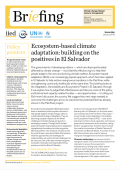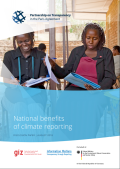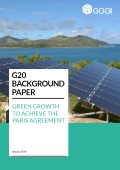
This briefing looks at the Adaptation, Vulnerability and Ecosystems Project in El Salvador; through it the authors explore how to judge EbA effectiveness and discuss some of the policy, institutional and capacity-related hurdles — and opportunities — to rolling out EbA more fully across the country.

The discussion paper, National Benefits of Climate Reporting, intends to highlight benefits that a country can obtain through transparent and ambitious climate reporting and a robust and self-sustained Measurement, Reporting and Verification (MRV) system, which go beyond the obvious benefit of fulfilling current and future reporting requirements under the UNFCCC. By highlighting the national benefits that are less visible at first glance, the discussion paper seeks to enhance the understanding of policy-makers and other stakeholders as to why transparency and MRV for climate reporting has merits of its own, and how countries may tap such national benefits. To this end, the discussion paper identifies and describes a number of such national benefits and provides concrete experiences and examples from various countries.

This policy brief, How to Better Reflect Transport in Climate Action Efforts, addresses the transport sector, the second-largest emitting sector in the world, and how to streamline it into the climate change policy process.

This report focuses on the challenges and opportunities faced by developing countries that are related to the Paris Agreement. It reviews the experience of the Global Green Growth Institute's (GGGI's) member countries in the development of national green growth plans, NDC action plans and roadmaps, and the low-emission development strategy for a small island developing nation. It then evaluates experience related to the implementation and financing of such green growth plans in a number of high-priority areas, including the renewable energy transition, electrification of transportation, green buildings and infrastructure, and green employment.

Renewable energy has advanced rapidly in the Gulf Cooperation Council (GCC) countries since 2014. The project pipeline reached almost 7 gigawatts (GW) of new power generation capacity by 2018, after the United Arab Emirates (UAE) made record-breaking bids in renewable energy auctions and Saudi Arabia made solar power cost-competitive with conventional energy technologies. Abundant resources, together with strong enabling frameworks, have led to solar PV prices of below USD 0.03 per kilowatt hour and dispatchable concentrated solar power (CSP) of USD 0.07 per kilowatt hour, which is less than some utilities in the region pay for natural gas.
